|
|
|
Sort Order |
|
|
|
Items / Page
|
|
|
|
|
|
|
| Srl | Item |
| 1 |
ID:
075569
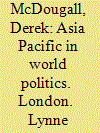

|
|
|
|
|
| Publication |
London, Lynne Rienner Publishers, 2007.
|
| Description |
xi, 371p.
|
| Standard Number |
1588261700
|
|
|
|
|
|
|
|
|
|
|
|
Copies: C:1/I:0,R:0,Q:0
Circulation
| Accession# | Call# | Current Location | Status | Policy | Location |
| 052093 | 327.5/MCD 052093 | Main | On Shelf | General | |
|
|
|
|
| 2 |
ID:
075789
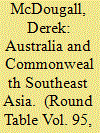

|
|
|
|
|
| Publication |
2006.
|
| Summary/Abstract |
Australia has historical links to the contemporary states of Malaysia, Singapore and Brunei through the British Empire and Commonwealth. While Australian relations with these countries in more recent times have been influenced by a range of factors, the Commonwealth connection remains significant. Politico-cultural tensions complicated the Australian relationship with Malaysia during the Mahathir era from 1981 to 2003. Nevertheless, the substantive aspects of the relationship remained strong. There was potential for cultural tensions in the relationships with Singapore and Brunei but no major rifts developed; Singapore has been a key partner for Australia in the region. Thus Australia has strong relationships with the three states of Commonwealth Southeast Asia in the areas of security, economics and education, with the imperial and Commonwealth past being a contributing factor in each case
|
|
|
|
|
|
|
|
|
|
|
|
|
|
|
|
| 3 |
ID:
108143
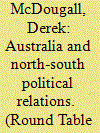

|
|
|
|
|
| Publication |
2011.
|
| Summary/Abstract |
North-South issues as such do not figure prominently in Australia's international policy but are mostly implicit. These issues arise particularly in the context of Australia's relations with countries in its immediate vicinity, including the South Pacific, Indonesia and East Timor. There are also some global issues in the North-South context where Australia is affected. Australian governments, in developing policies relating to this context, have been influenced by a 'practical realism' that puts first priority on Australian interests as perceived by governments at any given time. The way in which those policies have been developed, in both the regional and the global contexts, can be assessed through an examination of issues relating to security and international economic relations. Australia's alliance relationship has a strong bearing on the way Australia approaches the security issues. In relation to international economic issues there are many commonalities with fellow producers of raw materials in the Global South.
|
|
|
|
|
|
|
|
|
|
|
|
|
|
|
|
| 4 |
ID:
073210


|
|
|
| 5 |
ID:
072499
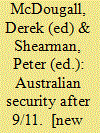

|
|
|
|
|
| Publication |
Aldeshot, Ashgate Publishing House, 2006.
|
| Description |
xviii, 214p.
|
| Standard Number |
0754645150
|
|
|
|
|
|
|
|
|
|
|
|
Copies: C:1/I:0,R:0,Q:0
Circulation
| Accession# | Call# | Current Location | Status | Policy | Location |
| 051378 | 355.033094/MCD 051378 | Main | On Shelf | General | |
|
|
|
|
| 6 |
ID:
130174


|
|
|
|
|
| Publication |
2014.
|
| Summary/Abstract |
In responding to China's rise, the best strategy for Australia involves a combination of accommodation and ''soft balancing.'' The viability of this strategy is related to the extent to which U.S.-China relations are cooperative or conflictual. Recent Australian governments have been successful in implementing this preferred strategy.
|
|
|
|
|
|
|
|
|
|
|
|
|
|
|
|
| 7 |
ID:
183460


|
|
|
|
|
| Summary/Abstract |
Focusing on the conflicts in the Southern Philippines and West Papua, this article uses a framework developed from the literature on the internationalisation of ethnic conflict to suggest insights into international involvement in both conflicts. In both cases there are succinct overviews of the relevant general background to the conflict, and international involvement in particular, followed by a characterisation in terms of typological features that covers motives for involvement, objectives, means of involvement, and impact. Insights into international involvement in the two conflicts can suggest ways in which aspects of the general literature might be developed further, but two cases are insufficient to develop more broad ranging generalisations. A key insight is the way in which specifically political factors can affect the way in which motives for involvement manifest themselves, the significance of Sabah politics in relation to Malaysian involvement in the Southern Philippines, and West Papuan lobbying in the Melanesian countries being cases in point.
|
|
|
|
|
|
|
|
|
|
|
|
|
|
|
|
| 8 |
ID:
058969
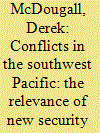

|
|
|
|
|
| Publication |
Aug 2004.
|
| Summary/Abstract |
In recent years the two major conflicts affecting the island countries of the Southwest Pacific have been in Bougainville and Solomon Islands. After reviewing the ways in which these conflicts have developed, this article asks whether any of the new perspectives in security studies are relevant to these situations. The broadening in scope suggested by terms such as 'comprehensive security' and 'human security' is helpful in this respect. Some of the insights from more particular approaches such as the 'new wars' thesis and the literature relating to the role of economic factors in civil wars are useful. The concept of state failure is helpful for understanding the situation that has developed in Solomon Islands. Some of the issues in the broader discussion about international intervention have a bearing on both Bougainville and Solomon Islands.
|
|
|
|
|
|
|
|
|
|
|
|
|
|
|
|
| 9 |
ID:
030574
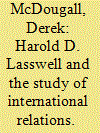

|
|
|
|
|
| Publication |
Lanham, University Press of America, 1984.
|
| Description |
xxii, 370p.
|
| Standard Number |
0819142964
|
|
|
|
|
|
|
|
|
|
|
|
Copies: C:1/I:0,R:0,Q:0
Circulation
| Accession# | Call# | Current Location | Status | Policy | Location |
| 028665 | 327.072/MCD 028665 | Main | On Shelf | General | |
|
|
|
|
| 10 |
ID:
094044


|
|
|
|
|
| Publication |
2010.
|
| Summary/Abstract |
Using the typology developed by Douglas Foyle, this article argues that John Howard behaved as a 'pragmatist' in dealing with situations where public opinion was relevant to Australia's engagement with Asia. Howard adhered to his own views on the relevant issues while attempting to lead public opinion in the direction he believed desirable. During the 1996-2007 period the most relevant issues relating to the impact of public opinion on Australia's Asian engagement were Australia's relations with Indonesia and Asian immigration. In the case of Australian-Indonesian relations the Howard government had to deal with various situations where an activated public opinion threatened to undermine the long term Australian approach that gave primacy to Indonesian concerns. Political leadership entailed developing a response that the government believed to be appropriate to Australia's long term objectives, while also attempting to persuade the public that this was the case. In the second instance policy developed in a more 'deliberative' context: Howard modified his earlier stance that was critical of Asian immigration, but continued to adhere to a strongly 'integrationist' position. This position was consistent with both his own views and his perception of public attitudes on the matter.
|
|
|
|
|
|
|
|
|
|
|
|
|
|
|
|
| 11 |
ID:
079669
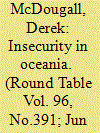

|
|
|
|
|
| Publication |
2007.
|
| Summary/Abstract |
During the Cold War security concerns in Oceania were predominantly state-centred, involving such issues as 'strategic denial' in relation to the USSR, French nuclear testing and the Kanak demand for independence in New Caledonia. In the post-cold war era 'comprehensive security' provides a useful framework for assessing security in Oceania. This framework covers various issues, including political and societal security (particularly failing states), economic security, environmental security and various new international agenda issues (such as organized crime, terrorism and health). 'Enhanced regionalism' has been an important response to these various challenges. Australia has assumed a leading role in the development of this response, and also led the international intervention in Solomon Islands in 2003. Stronger regional cooperation is likely to result from the Pacific Plan, although not to the extent sought by Australia. The response to insecurity in Oceania needs to focus on long-term development issues.
|
|
|
|
|
|
|
|
|
|
|
|
|
|
|
|
| 12 |
ID:
053079
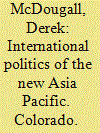

|
|
|
|
|
| Publication |
Colorado, Lynne Rienner Publishers, 1997.
|
| Description |
xi, 257p.
|
| Standard Number |
1555877230
|
|
|
|
|
|
|
|
|
|
|
|
Copies: C:1/I:0,R:0,Q:0
Circulation
| Accession# | Call# | Current Location | Status | Policy | Location |
| 039573 | 327.5/MCD 039573 | Main | On Shelf | General | |
|
|
|
|
| 13 |
ID:
183455


|
|
|
|
|
| Summary/Abstract |
The Westphalian system provides the global context of international relations within which the recent and contemporary ‘small wars and insurgencies’ of Maritime Southeast Asia have developed. Usually dated to the Peace of Westphalia in 1648, ending the Thirty Years’ War in Europe, the Westphalian system located sovereignty in states, following the principle of cuius regio, eius religio (whose realm, their religion). This system replaced arrangements where sovereignty was more mixed, leading at times to conflict over the location of authority.
|
|
|
|
|
|
|
|
|
|
|
|
|
|
|
|
| 14 |
ID:
110068
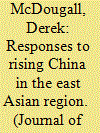

|
|
|
|
|
| Publication |
2012.
|
| Summary/Abstract |
While the strategic response to 'rising China' in the broader East Asian region has been varied, the strongest emphasis has been on 'soft balancing'. This approach is clearly evident in the strategies pursued by the most significant of the major powers, the United States, Japan and India, as well as by other powers such as Australia, Indonesia and Vietnam. However, other responses such as accommodation and hedging have also featured for various states within the region. Frequently the response of a particular state will involve a number of elements. Soft balancing is most prominent in relation to the security dimension. Economic interaction encourages other kinds of responses. Whatever the overall approach adopted, a key factor is domestic politics, particularly the perceptions of the relevant elites.
|
|
|
|
|
|
|
|
|
|
|
|
|
|
|
|
| 15 |
ID:
096900
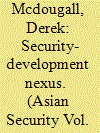

|
|
|
|
|
| Publication |
2010.
|
| Summary/Abstract |
The focus of this article is the relationship between security and development in East Timor and Solomon Islands. External intervention occurred in East Timor in 1999 and 2006, and in Solomon Islands in 2003. Intervention was effective in restoring order in these situations in the short term, but questions remained about long-term strategies for achieving security. Although "development" is proposed as the best way to attain security broadly defined, there are arguments about what development should entail and who should determine its direction. Development strategies giving greater attention to the local level and to customary governance are more likely to achieve legitimacy than those that focus on state-building alone, thus contributing to greater security in the long term.
|
|
|
|
|
|
|
|
|
|
|
|
|
|
|
|
| 16 |
ID:
177590
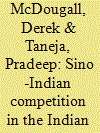

|
|
|
|
|
| Summary/Abstract |
Discussion of Sino-Indian competition in the Indian Ocean region has focused on the two major powers, but there is scope to give more attention to the role of the island states. Using a structure-agency approach, this article assesses the agency of four Indian Ocean island states in relation to Sino-Indian competition: Sri Lanka, Maldives, Mauritius, Seychelles. In the context of India’s and China’s engagement with the island states, one can analyze the factors that either enhance or detract from the agency of those island states. These states have important economic links with both India and China without being overly dependent on either. India plays the leading security role, but China has also been developing its security links. Political consensus within an island state enhances leverage vis-à-vis the external powers, particularly in Mauritius and Seychelles; Sri Lanka and the Maldives have more conflictual politics, giving rise to greater Sino-Indian competition.
|
|
|
|
|
|
|
|
|
|
|
|
|
|
|
|
|
|
|
|
|